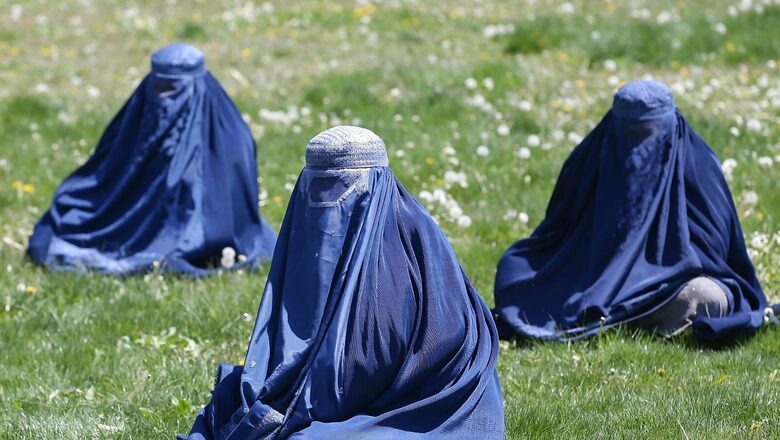
views
We will be moderate, the Taliban said after taking over Afghanistan in August. However, countless women in the war-torn country knew otherwise. They had physical, mental, and financial remnants of the scars the militant group left with their earlier rule.
The Taliban, who in early September, came up with their new ‘caretaker government’ for Afghanistan, are desperate for international recognition. The promises of a more “moderate” rule have followed – with the Taliban promising to protect the rights of women and minorities in their first press conference after seizing power. However, reports of torture of women, similar to the incidents during their rule from 1996 to 2001, continue to come up. The Taliban have also replaced the country’s women’s ministry with that of its contentious moral police, the Ministry for Propagation of ‘Virtue’ and Prevention of ‘Vice’.
The Ministry has returned after twenty years, and its history is not encouraging. Visuals of morality police patrolling street haunt back, in their attempt to enforce the group’s rigid interpretation of Islamic law.
What Did the Ministry of Virtue and Vice Do Back Then?
The vice and virtue department became a notorious symbol of arbitrary atrocities, particularly against Afghan women and girls. It was the Taliban’s most feared institution.
According to a report by Reuters, The department used public beatings and incarceration to aggressively enforce restrictions on both men and women. It was in charge of enforcing Islamic regulations (Hanafi principles) as defined by the Taliban. Its religious police raided the streets, detaining ladies who were not properly clothed as well as others who were listening to music.
The department publicly chastised women for, among other things, wearing insufficiently opaque socks, displaying their wrists, hands, or ankles, and not being accompanied by a close male relative. They prohibited women from educating their daughters in home-based schools, working, or begging. Men were also beaten for shaving their beards.
Its forces patrolled the streets beating and arresting people who listened to music or women and girls who did not wear the full-body burqa. That ministry was also in charge of conducting Islamic punishment, such as the stoning of women charged with adultery.
It was dissolved after the Taliban were deposed, but Fazal Hadi Shinwari, an outspoken supporter of orthodoxy and Chief Justice of Afghanistan’s Supreme Court, reopened it in 2003 and renamed it the Ministry for Haj and Religious Affairs. Interestingly, after the fall of the regime, demands of the Ministry’s reconstitution came up time and again in Afghanistan. In 2006, President Hamid Karzai’s cabinet had approved a proposal to reestablish the department. Human Rights experts had condemned the move.
At the time, Nematullah Shahrani, the minister of Haj and religious affairs, who would oversee the department, had stated that it would focus on alcohol, drugs, crime, and corruption. However, Afghanistan’s criminal laws already address these issues. Afghanistan’s Ulema Council had also suggested Karzai around the same time for the department to be set up again.
What Can it Do Now?
Two Taliban members, who spoke on the condition of anonymity because they were not permitted to speak to the media, said Mohamad Khalid, the minister designated to oversee the reconstituted government body, was a religious law expert, the Washington Post reported. “The ministry will have their own officials, but no police or soldiers,” one of the two said. “The ministry has not yet begun operations. Its mission will be to “preach the virtues and teachings of Islam, as well as to keep people away from vice and unlawful acts,” he stated. “It is a vital ministry.”
Reports of the Taliban’s atrocities on women, minorities, and citizens have been aplenty since the Taliban first started taking over Afghanistan. Even after Kabul fell, and despite their promises, women are now being prevented from working with their male colleagues, studying with men.
In a Sky News report, Afghan lawyer Najla Ayoubi had narrated horrible experiences of the militant group’s atrocities on women. She said one woman was “put on fire because she was accused of bad cooking for Taliban fighters” in northern Afghanistan. “They are forcing people to give them food and cook them food. Also, there are so many young women are being in the past few weeks being shipped into neighbouring countries in coffins to be used as sex slaves,” she had said.
An Afghan woman journalist had also previously been barred from working at her TV station after the Taliban took control of the country. In a video pleading help, well-known news anchor Shabnam Dawran said “I didn’t give up after the change of system and went to attend my office, but unluckily I was not allowed despite showing my office card.”
“The male employees, those with office cards were allowed to enter the office but I was told that I couldn’t continue my duty because the system has been changed.” Dawran then pleads with viewers, saying: “Those who are listening to me, if the world hears me, then please help us as our lives are under threat.”
Two Talibans?
The Taliban government, faced with a humanitarian crisis with blocked medical supplies and a collapsing economy, had earlier asked women to return to their work in the Public Health Department. However, women are reporting being refused from their offices in many other instances. This brings the question of two Talibans: one on the ground and one governing.
According to Foreign Policy report, the top of the Taliban hierarchy, many of whom spent years abroad during the just-concluded war, plainly intend to depict themselves as compassionate and reformed rulers seeking legitimacy among Afghans and international acceptance. Far less evident is whether the rank-and-file Taliban members currently ruling Afghanistan as a whole want the same thing, let alone how and at whose price any subsequent disagreements within the Taliban will be resolved.
Risk of Losing General Progress?
As earlier stated in this report, the Taliban are not the only group in Afghanistan who wanted this Ministry back. In 2006, Deputy Minister for Haj and Religious Affairs Ghazi Suleiman Hamed had defended the department in an interview with RFE/RL’s Radio Free Afghanistan.
According to him, the new department would be quite different from the one run by the Taliban.
“The Taliban interpretation of Islam is different from the interpretation of the rest of the Islamic world,” he said. “No one has the right — under the excuse of promoting virtue and preventing vice — to commit a sin and harm others. The clerics want to help people to move toward God through any possible means, such as education, preaching, and encouragement. It doesn’t mean that, like in the past, there will be a [special] police and that prison and clubs will be used [against violators].”
Women in Afghanistan under a democratic government have made leaps and bounds in their education, careers. With the Taliban imposing back its laws, in line with the more hardline mindsets of Afghanistan, the fear remains of such principles cementing in a country that has always functioned under moral policing.
Read all the Latest News , Breaking News and Ukraine-Russia War Live Updates here.


















Comments
0 comment